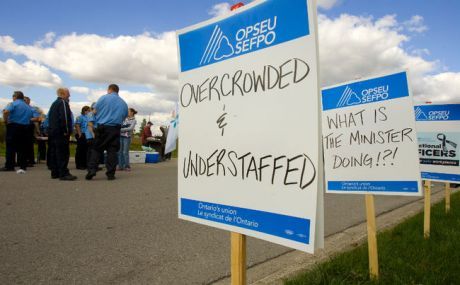Features
You are here
Corrections officers, capitalism and resistance

January 25, 2016
In January a strike by 6,000 Corrections officers (COs) and probation/parole officers (POs) in Ontario’s criminal justice system was narrowly averted after a protracted round of bargaining between OPSEU, the workers’ union, and Wynne’s government. A day before the strike deadline, a deal was made to send to the disputed agreement to binding arbitration and begin the process of making corrections work an essential service.
Although many workers are satisfied with this outcome, it comes at a price: the loss of the right to strike. The willingness to give the strike option away was motivated by the horrible conditions in Ontario’s correction facilities, including chronic overcrowding and understaffing. Years of chaos have created tension and frustration both for inmates and COs.
Corrections workers have been repeatedly raising the alarm about the deplorable conditions for inmates that also impact their working conditions. They have also, repeatedly, asked their union, OPSEU, to be more proactive in pressuring the Ontario government to do something to address the issues. These efforts have largely gone unheeded and it is this frustration, including a fear for their safety, which has caused these workers to see binding arbitration and the designation of their work as an essential service as a way out of a desperate situation.
Binding arbitration also means that the workers will not get to vote on their contract. Ironically, this follows a long battle in the bargaining process in which many corrections workers used their voting power to push the ratification of the ‘unified’ part of bargaining that covers all Ontario government employees down through a ‘No’ campaign. They, then, successfully turned down a tentative agreement for their own sector, which nearly led to a strike.
Although binding arbitration may lead to better wages, in line with “first responders” like firefighters, this solution is no guarantee that conditions will change in the prisons. Any “justice” system under capitalism mirrors the inequalities in the system as a whole. But, like every institution within the system, working people depend on the jobs the system creates to survive and they have no control over the conditions of their work.
Prisons and capitalism
COs have been a bone of contention for many on the Left, who correctly support the rights of prisoners, but incorrectly put the blame for bad conditions in the jails on the COs themselves, and their unions. In so doing, they ignore the systemic causes of the day-to-day brutality that continues in prisons everywhere.
No doubt, individual or groups of COs are responsible for acts of violence against prisoners. But they act within a context which is not of their own making. Prisons are tools of the capitalist class to discipline the working class and the oppressed. When workers step out of line by refusing to accept their living conditions, they are sent to prison. As such, the vast majority of prisoners are charged with crimes related to addiction, often times crimes against property. Conversely, an executive responsible for injuries or death of workers on the job can laugh their way through the court system, let alone end up behind bars. That same executive may commit fraud to the tune of millions, and end up with a slap on the wrist. A worker who steals millions will spend his or her life in jail.
COs are in effect guarding a population made up of the exploited and the oppressed. The prison population is increasing, as the right-wing attempts to further criminalize behaviours of workers, as opposed to the behaviour of their own kind. The culture in which COs exist is one that mirrors the worst aspects of capitalist society: a top down, command structure based on military-style obedience.
The brutality of individual COs is tolerated, if not encouraged by senior management, who then publicly (and hypocritically) wash their hands of it. If they, as managers, ordered such brutality stopped, COs would be forced to obey, and it would stop. But they don’t. For them prisons are all about punishing the oppressed, and COs are the tools.
Workers
COs are hardly alone when it comes to the repressive arm of the capitalist system. Workers in shelters, halfway houses, group homes for example often play a similar role. The violence that can be out of control in those facilities is quietly condoned, if not encouraged by senior management. Workers, there, like COs, take the cue, as they need to make a living. Under capitalism, that means doing what the boss says.
The denial of benefits to social assistance recipients can be considered a form of violence, especially when it leads to someone losing their housing, their health, their families via Children’s Aid etc. Capitalist society is full of workers who play punitive roles. Why focus on COs alone?
Socialists argue that the answer is to be found in ridding ourselves of capitalism, not blaming those who do its dirty work to survive. Unions are part of the answer. As with COs, who are organized provincial or federal government workers, many workers who end up playing to some degree a punitive role are unionized public sector employees.
When these workers but forward demands for better conditions in the workplace, most often this can also affect the living conditions of inmates or clients positively—and as such, these workers, and their unions should be supported.
Sanctimonious finger pointing at other working class people will never bring change. Building unity between unions and the exploited and oppressed who are forced into such facilities is the only way to effect real change, build a challenge to the system we all have an interest in defeating.
Section:









